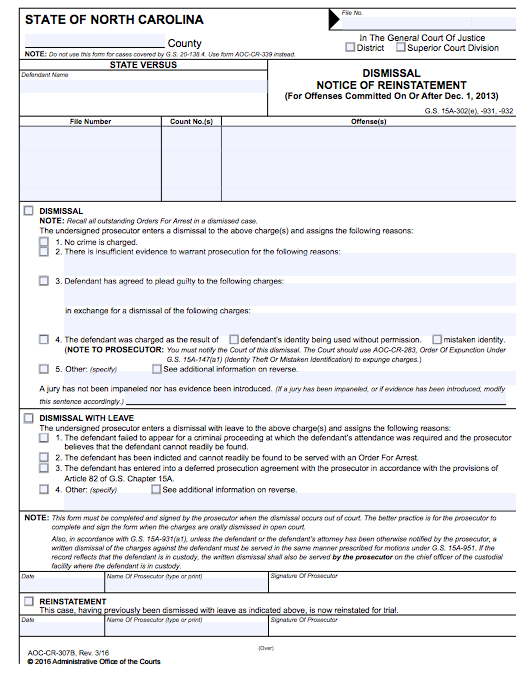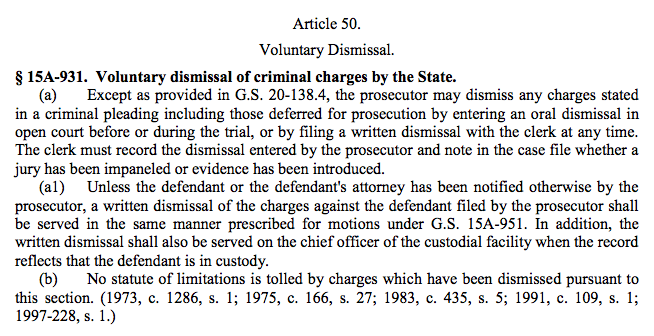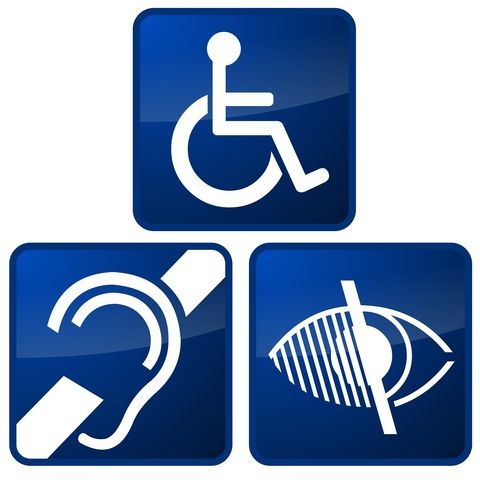Can I Dismiss Charges? What Happens If I Don’t Want to Prosecute? Do I Get a Say? Who Decides?
Can you drop the charges? Not really. Can the State choose not to prosecute? Yes, in large measure it’s their decision – Bill Powers
Prosecutors sometimes consider and weigh these case facts before deciding to prosecute an individual:
- Availability of Witnesses
- Prior Record of the Accused
- Prior Deferrals, Deferred Prosecution
- Severity of the Offense
- Factual Scenario
- Consistency in Statements
- Proper Charging Documentation
- Existence of Physical Evidence
- Photographs
- Illustrations
- Video
- Audio
- Medical Records
- Written Statements
- Confessions

See More: Dismissal Notice of Reinstatement North Carolina 2017

See More: Dismissal of Charges North Carolina 2017

Modified Transcript of “What happens if I don’t want to prosecute?” for the Hearing Impaired
Hi, there. This is Bill Powers of Powers Law Firm PA.
I’m a Charlotte Mecklenburg attorney who helps people in the surrounding jurisdictions in the State of North Carolina. We have had a good response to these online type of questions.
These aren’t clients. These are just people posting things on public List Serves and message boards.
The question I have right here is, can I drop charges that I filed against my son for taking a blank check, filling it out and cashing it?
Basically, it sounds like someone took a check without permission, filled it out for some money and then went and cashed it at a bank. There are really two issues there. First is this appears to be someone who was the victim of a case, and it’s rather serious case, for the record, it could be.
Can’t tell from the inquiry, but it could be a felony especially if it involves a bank.
Does that person have a right, if you will, to drop the charges?
That’s a sticky issue because frankly, the person responsible for deciding whether or not to proceed on any criminal case in North Carolina is the prosecutor, the district attorney or the assistant district attorney, as the case may be in that jurisdiction.
The crime, if you will, is a crime against the State of North Carolina even though it involves an individual. They are charged with the duty and the responsibility of going through cases and seeing which ones they think are prudent for prosecution or not.
There’s a fair amount of discretion here, frankly, as it should be. Now that is not to say though that they don’t listen to the victim. My experience has been very much so, that they listen to the victim, but there are times and circumstances where as much as they empathize with a parent or a loved one’s desire to drop charges against their own kin, they can’t do it.
They don’t feel it’s prudent. They don’t think it’s best for the community, and they’ll proceed forward with which would be a witness who doesn’t necessarily want to go forward themselves.
Can you drop the charges? Not really. Can the state choose not to prosecute?
That’s correct or a more accurate way of putting it. Now this is an instance though where it’s serious. There are a lot of different moving parts here. I’d want to know how much the value of the check was.
I’d want to know what the background of the check was. I’d want to know what the background of the individual who did this? Is this something related to a drug problem?
Is this something that someone has maybe some kind of psychiatric issue or history of doing things, not making good choices? There’s a lot of background material or considerations that I’d want to know as an attorney.
You may benefit from speaking with an attorney.
Most lawyers, criminal defense lawyers, will offer a free consultation.
Generally speaking, at my law firm we would not want to speak with the prosecuting witness. We would refer that person to the specific district attorney’s office and maybe after some level of discourse, conversation with the DA’s office, we could have a conversation between the legal professionals.
That’s to make sure that everyone is represented by counsel, and there aren’t any questions about the respective roles.
That’s a personal choice as a professional. Other lawyers may disagree with me on it. That’s just the way I prefer to go.
Either way, it’s a good question. It happens more often than you want. Thank you for posting it.
Bill Powers
Bill@342help.com
www.carolinaattorneys.com/
2412 Arty Avenue
Charlotte, NC 28208
704-342-4357
 Carolina Law Blog
Carolina Law Blog